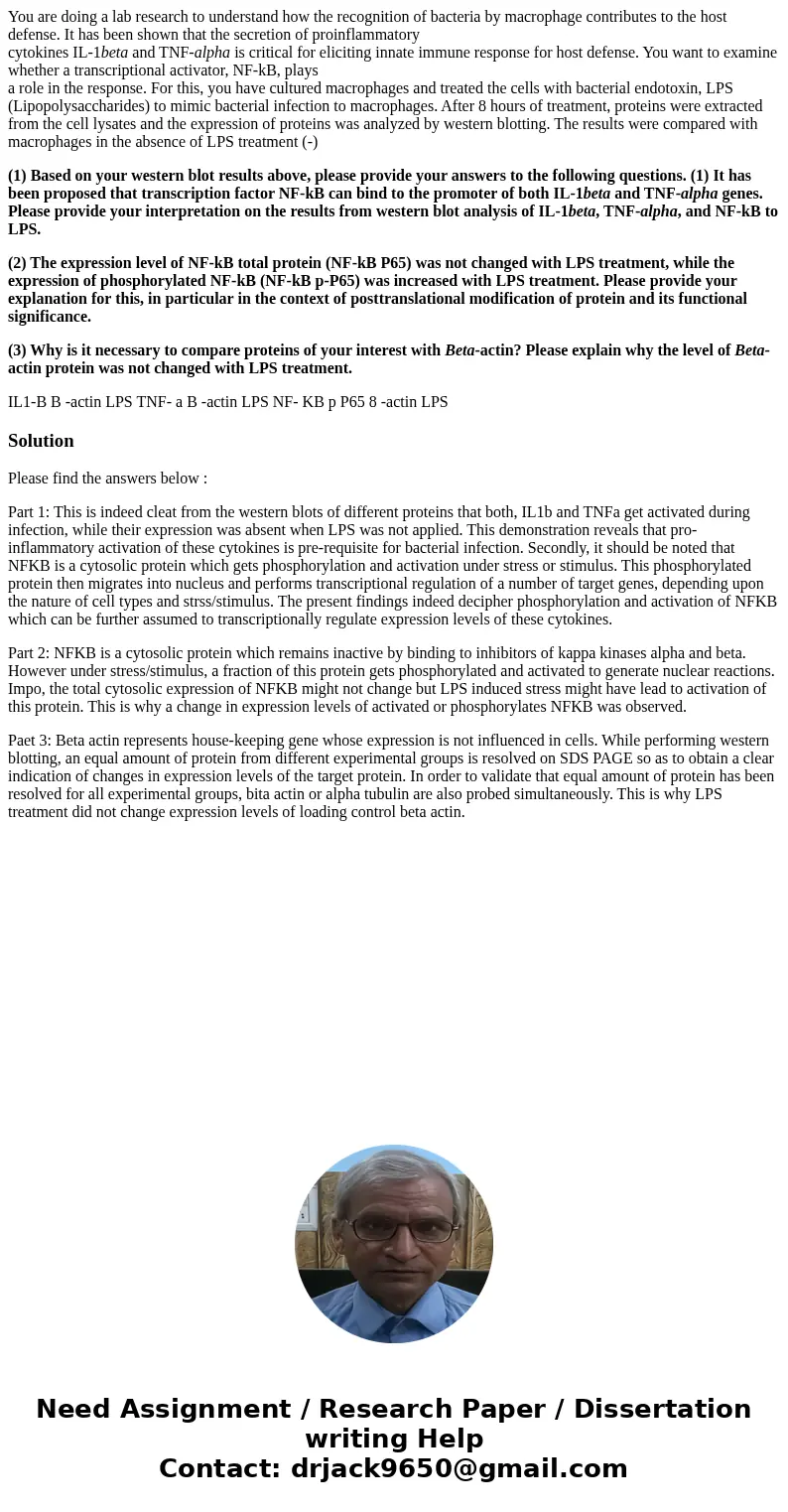You are doing a lab research to understand how the recogniti
You are doing a lab research to understand how the recognition of bacteria by macrophage contributes to the host defense. It has been shown that the secretion of proinflammatory
cytokines IL-1beta and TNF-alpha is critical for eliciting innate immune response for host defense. You want to examine whether a transcriptional activator, NF-kB, plays
a role in the response. For this, you have cultured macrophages and treated the cells with bacterial endotoxin, LPS (Lipopolysaccharides) to mimic bacterial infection to macrophages. After 8 hours of treatment, proteins were extracted from the cell lysates and the expression of proteins was analyzed by western blotting. The results were compared with macrophages in the absence of LPS treatment (-)
(1) Based on your western blot results above, please provide your answers to the following questions. (1) It has been proposed that transcription factor NF-kB can bind to the promoter of both IL-1beta and TNF-alpha genes. Please provide your interpretation on the results from western blot analysis of IL-1beta, TNF-alpha, and NF-kB to LPS.
(2) The expression level of NF-kB total protein (NF-kB P65) was not changed with LPS treatment, while the expression of phosphorylated NF-kB (NF-kB p-P65) was increased with LPS treatment. Please provide your explanation for this, in particular in the context of posttranslational modification of protein and its functional significance.
(3) Why is it necessary to compare proteins of your interest with Beta-actin? Please explain why the level of Beta-actin protein was not changed with LPS treatment.
IL1-B B -actin LPS TNF- a B -actin LPS NF- KB p P65 8 -actin LPSSolution
Please find the answers below :
Part 1: This is indeed cleat from the western blots of different proteins that both, IL1b and TNFa get activated during infection, while their expression was absent when LPS was not applied. This demonstration reveals that pro-inflammatory activation of these cytokines is pre-requisite for bacterial infection. Secondly, it should be noted that NFKB is a cytosolic protein which gets phosphorylation and activation under stress or stimulus. This phosphorylated protein then migrates into nucleus and performs transcriptional regulation of a number of target genes, depending upon the nature of cell types and strss/stimulus. The present findings indeed decipher phosphorylation and activation of NFKB which can be further assumed to transcriptionally regulate expression levels of these cytokines.
Part 2: NFKB is a cytosolic protein which remains inactive by binding to inhibitors of kappa kinases alpha and beta. However under stress/stimulus, a fraction of this protein gets phosphorylated and activated to generate nuclear reactions. Impo, the total cytosolic expression of NFKB might not change but LPS induced stress might have lead to activation of this protein. This is why a change in expression levels of activated or phosphorylates NFKB was observed.
Paet 3: Beta actin represents house-keeping gene whose expression is not influenced in cells. While performing western blotting, an equal amount of protein from different experimental groups is resolved on SDS PAGE so as to obtain a clear indication of changes in expression levels of the target protein. In order to validate that equal amount of protein has been resolved for all experimental groups, bita actin or alpha tubulin are also probed simultaneously. This is why LPS treatment did not change expression levels of loading control beta actin.

 Homework Sourse
Homework Sourse